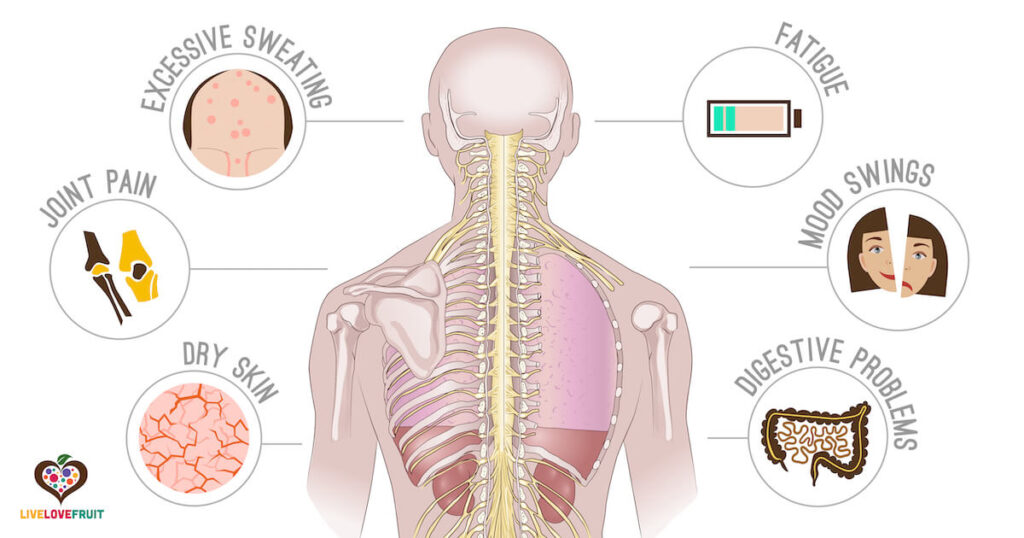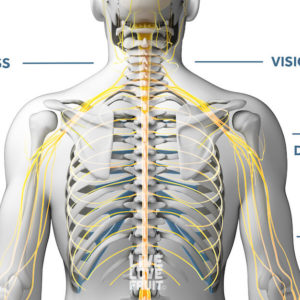
If you don’t spend enough time in the sun, then you may not be getting enough vitamin D. In fact, over 40% of the U.S. population has a vitamin d deficiency, meaning higher rates of disease and illness, especially cancer.
Vitamin D deficiency increases the risk of not only cancer, but type I diabetes, cardiovascular disease, and osteoporosis. Exposure to sunlight, which enhances vitamin D3 production in the skin, is important because very few foods naturally contain vitamin D, and not many people supplement, and when they do, they supplement with the wrong type of vitamin D.
What is Vitamin D Used For in The Body?
Vitamin D can affect the expression of over 1,000 genes, with the possibility of affecting over 27,000. It is produced in your skin in response to sunlight (specifically UVB-rays), and has several important functions.
1. Regulates absorption of calcium and phosphorous
Vitamin D is important for maintaining a healthy skeleton. Vitamin D helps keep serum calcium and phosphorus concentrations within the normal range to promote mineralization of bones and maintain essential cellular functions. Lack of vitamin D has been recognized as a major cause of metabolic bone diseases in seniors like osteomalacia and osteoporosis.
2. Facilitates normal immune system function
An important immune system regulator, vitamin D has been shown to inhibit the development of autoimmune diseases. Several epidemiological studies have linked poor vitamin D levels to higher susceptibility of immune-mediated disorders, like chronic infections and autoimmune diseases.
3. Muscle function
Vitamin D has the ability to change gene transcription of messenger RNA and subsequent protein synthesis. What does this mean? Without enough vitamin D, our bodies won’t be able to build the proteins necessary to support proper muscle growth.
4. Cardiovascular function (reduces your risk of developing heart disease)
Vitamin D receptors are distributed in the vascular smooth muscle, endothelium and cardiomyocytes, and deficiency has been linked with cardiovascular disease.
5. Brain development (reduces chance of developing multiple sclerosis)
The vitamin D receptor (VDR) and 1-alpha-hydroxylase (the enzyme responsible for formation of active vitamin D) have been found in the human brain, which suggests an important role for its utilization in nervous system processes. One study found that high circulating levels of vitamin D are associated with a lower risk of MS (a disease that affects the nervous system).
6. Significantly reduces your risk of developing cancer
If you do a basic search in the PubMed database, you will find over 63 observational studies that correlate vitamin D consumption with reduction in cancer risk. Vitamin D has anti-proliferative effects on cancer, activating apoptotic pathways that inhibit the growth of cancer cells.
7. Improves respiratory function
Observational studies suggest that a lack of vitamin D increases ones risk of respiratory infections, which may contribute to wheezing illnesses in children and adults, and irritate asthmatic conditions.
Vitamin D Deficiency and Disease
If you’re experiencing any of the below, you might be deficient in vitamin D. Ask your doctor for a blood test and get them to check your vitamin D levels. Unless you get outside in the sun daily (and expose a good portion of your skin) it’s likely that your levels are low.
You may also be deficient if your city has high pollution (and thus un-clear skies), if you use sunscreen, work long office hours, or live in the city where buildings block the sunlight.
Lack of vitamin D can result in:
– Mental disorders like schizophrenia and depression
– Infections like tuberculosis, upper respiratory tract infections, asthma and wheezing, and syndrome X
– Autoimmune diseases like type I diabetes, multiple sclerosis, Chron’s disease and rheumatoid arthritis
– Muscle weakness and aches
– Bone and joint problems like osteoarthritis, osteoporosis, osteomalacia, and rickets
– Malabsorption issues which can trigger celiac disease, liver disease, cystic fibrosis, whipples and Chron’s disease
– Cancer of the breast, colon, prostate and pancreas.
The Sun Vs. Supplementation
So what is actually better? The sun or supplementation?
According to Australian researchers, vitamin D supplements are immunosuppressive and can actually make diseases worse. Trevor Marshall, Ph.D., professor at Australia’s Murdoch University School of Biological Medicine and Biotechnology, states that the Vitamin D Nuclear Receptor (VDR) influences over 1,000 genes, including those associated with cancers, autoimmune disease and infection. Their study found that supplemental vitamin D blocks VDR activation, which is the opposite effect to that of sunshine.
Vitamin D supplements suppress the immune system, so making sure you get enough sun is crucial. Although the article mentioned above doesn’t state what type of supplementation was used, it is important to note that if you live in the Northern Hemisphere and get absolutely no sun contact during winter months, that you should be supplementing with some type of vitamin D – but make sure you are using the right stuff.
Vitamin D2 (the stuff added to milk), is much less effective than vitamin D3, and although vitamin D3 often comes from animal sources like eggs, organ meats, animal fat, cod liver oil, and fish, I found a great alternative that is synthesized from mushrooms (which, when exposed to sunlight, are a great source of vitamin D3!).
As for the sun – get out and get some sunshine! Getting at least 15-20 minutes of sun a day will provide you with more than enough vitamin D production for that day – but make sure you don’t wash off after. It takes over 48 hours for vitamin D3 to penetrate your skin and reach your bloodstream – that’s two whole days. So, if you shower twice a day, with soap, you’re basically just washing away all of the vitamin D3 your skin generated (which may also account as to why so many people are vitamin D deficient, considering how often people have showers).
Give your body a day or two to soak up the beneficial vitamin D – going without a shower for a few days has its benefits, and if you follow a clean lifestyle, you won’t have any reason to be concerned about your smell, as you’ll have none!
Your skin also produces more vitamin D3 if you expose it during the middle of the day. UVB rays (the ones that help your body produce vitamin D) are strongest at the peak of the day, when they reach an angle that is high enough so that the atmosphere doesn’t block them. UVB rays are blocked at low angles (beginning of the day and end of the day, and also during winter months when the sun doesn’t reach high angles).
If you want some protection, use some jojoba oil or coconut oil – they’re both natural sunscreens that contain an SPF of 10 or more (and don’t contain nasty chemicals that increase your risk of skin cancer).
Sources:
http://articles.mercola.com/sites/articles/archive/2008/02/12/why-vitamin-d-supplements-are-not-the-same-as-sunlight.aspx
http://www.ncbi.nlm.nih.gov/pubmed/14985208
http://www.sciencedaily.com/releases/2008/01/080125223302.htm
http://www.vitamind.co.nz/uploads/Articles/VITAMIN%20D%20DISCOVERY%20OUTPACES%20FDA%20DECISION%20MAKING.pdf
http://www.ncbi.nlm.nih.gov/pmc/articles/PMC1470481/#r7
http://www.vitamindcouncil.org/about-vitamin-d/what-is-vitamin-d/
http://www.ncbi.nlm.nih.gov/pubmed/8642450
http://ajcn.nutrition.org/content/80/6/1717S.short
http://www.sciencedirect.com/science/article/pii/S1471489210000378
http://link.springer.com/article/10.1007/s001980200012
http://circ.ahajournals.org/content/117/4/503.short
http://www.ncbi.nlm.nih.gov/pubmed/17179460
http://www.sciencedirect.com/science/article/pii/S0891061804001176
http://www.nature.com/nrc/journal/v7/n9/abs/nrc2196.html
http://link.springer.com/article/10.1007/s11882-009-0012-7









[…] Vitamin D, an important vitamin that manages calcium in your blood, bones and gut, helps cells all over your body communicate properly and is a major factor in determining how well your body fights cancer. […]